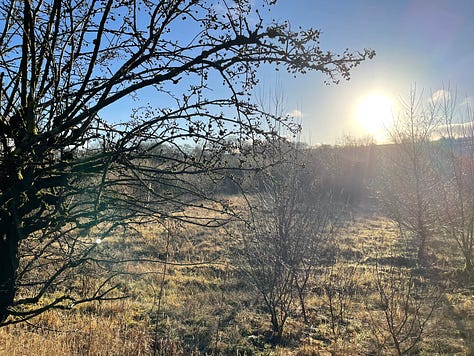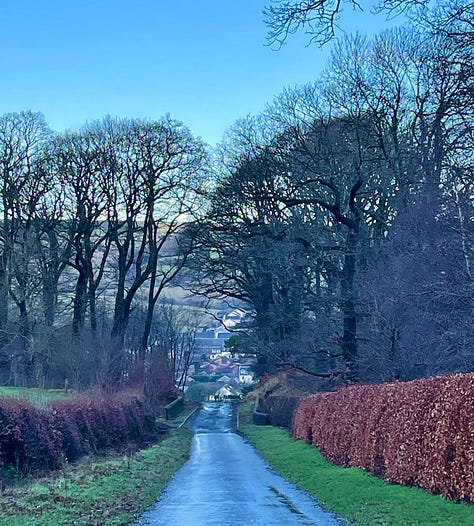Welcome back to The Angle 👋 And Happy Holidays 🎄 I am in the depths of Twixmas, consuming too much Baileys and watching too many Christmas movies. 🎅🏼






I am back home in Scotland for the holidays. It’s dreich — the wettest Christmas break in years. The lashings of rain have been nonstop from the moment I stepped foot in the country a week ago, which has made it difficult to get out on any brisk winter walks, a favorite holiday activity of mine. Yesterday, the rain finally cleared, for one day, and I managed to get out to enjoy the countryside on my doorstep.
Winter walks were a saving grace when I lived at home during lockdown. It was one of the few activities we were permitted to do during that time. On Saturday mornings, my mum and I would hike through the woodlands on the estate of a nearby 13th century castle. We’d make a pitstop at the estate’s makeshift coffee shack, which served takeaway coffees and hot chocolates — again all that was permitted during that time. We’d then continue to trek through the countryside for another hour and into the nearby villages. My mum and I would use the time to reflect on the week that passed and our long term goals. It’s a tradition that’s stuck with me. I have made some of my biggest decisions on these walks in the Scottish countryside. Yesterday’s walk gave me a chance to reflect on my first nine months of freelancing and what I wish I knew when I first started out. In today’s newsletter, I wanted to share those reflections.



Nine reflections on 9 months of freelancing
1) Time management is an art form that’s difficult to master
Each month I always overcommit or undercommit to work. I have never got it just right. I think this is because everything in freelancing takes much longer than you would expect, which makes it hard to judge what to say yes to.
You could file a story — knowing that it’s almost almost ready for publication and soon to be out of your hair — when an editor disappears for a week to two weeks. When the editor returns, there is often expectation that you can pick up those changes immediately.
Over-communicating your commitments and availability with clients can somewhat improve the process but at the end of the day you are often working to their calendar. I still end up with extreme peaks and troughs in busyness rather than a steady state flow.
You should be also prepared for a much slower work process. It can sometimes take two to three months from an article to go from accepted pitch to publication. I have published much less this year compared to working at a staff job, but I also have a portfolio this year filled with more pieces I am proud of.
2) There is no 8 hour workdays in freelancing
After working several staff and office jobs, I’ve been trained to believe I should work in a structure of 9-to-6, five days a week. This isn’t a framework that works for freelancing.
You shouldn’t try to push to work an eight hour day just because the calendar says its Monday even if you have no work on that day.
I rarely work an eight hour day. Sometimes it will be four hours, other times it will be 12. Sometimes I will work in the witching hours when I return home from a late evening gym class, other times I will work on weekends.
It takes time to adjust to the idea that as a freelancer you do not need to follow the rigidities of working schedules that offices and schools imposed on us. It is not lazy to wake up at 8am on a weekday or to take some downtime on a Wednesday afternoon if you are working at other points during the week. A clock doesn’t define your productivity.
3) Securing an anchor client or some form of base income is essential
Securing an anchor client early-on enabled me to give freelancing a proper shot. An anchor client or a part-time to job that will cover the cost of rent each month gives you peace of mind when freelancing.
The trade-off with this approach is that you will have less time to spend on pure journalism. With an anchor client, it can also be hard to judge how much you can commit around that work, though what you do commit to is likely to be higher impact work you really care about.
4) You will become an expert in contract law
With every new client comes a new contract to sign. In the space of nine months, I have become an expert in legalese and contract law. While it’s tempting to just sign the contract and dive into the work. It’s important to read the contract and check for overreach.
Many companies and publications will throw the kitchen sink into their contracts with freelancers. Among some of the clauses you might want to check for includes protection if litigation arises from work produced, a kill fee and dormancy clauses. One of the huge benefits of being a member of the National Union of Journalists is that their team will review the contracts you receive and help give you a steer on what to look out for in contracts and what to push back against.
5) It gets lonely
I don’t think I realized how much of a void work friends fill — virtual or in person — till I started freelancing. They act as sounding boards for all the weird happenings of the workplace, which is missing when fully immersed in freelancing. I am the biggest advocate of remote and flexible work, this was the case even pre-pandemic. I’ve made just as many great work friends virtually as I did when I sat physically in an office, this isn’t a rallying call against remote work or diminishing its benefits.
It’s just as a freelancer you are unlikely to be in team meetings or on Slack channels where deeper bonds are built over inside jokes. Some freelancers deal with this by heading to a coffee shop or co-working space. I haven’t found this works for me as the noise can be too distracting for most of my tasks. As an introvert, it can be very easy for me to stay at home and not build up a support network — a gap that only becomes noticeable when the going gets tough, precisely the moment when you should lean on others and when it’s the hardest to do so. I have no wise words of wisdom to share on the topic as I am still trying to figure it out. Next year, I am looking to more actively incorporate work social activities — beyond surface level networking events — into my schedule to build a better support network around me.
6) Freelancing is also uncomfortably transactional
Beyond loneliness, one of the most uncomfortable feelings in freelancing is disposability.
Managing finances is usually the topic that gets the most focus but I think a conversation around the transactional nature of the freelancing is just as important.
We need to talk about how overwhelming and frankly depressing it can be to work with clients who treat freelancers as a commodity. Newbies face the brunt of this since many don’t yet have a support network to navigate the ups and down of freelancing.
There is something about freelancing that enables very professional people to drop all standard working norms and pleasantries. It’s not necessarily a bad thing but it just takes getting used to especially when coming from a staff job.
Some clients will be incredibly curt, skipping the small talk and only listing everything that needs to be fixed with no positive feedback. This can be manageable on good days, but a sucker punch on a bad day.
Other clients will reach out with a sense of urgency, only to disappear just as quickly when the carefully crafted response doesn’t fit what they wanted to hear at the specific moment time. They will also have no qualms about reappearing with a different request weeks later without acknowledging their previous disappearance.
You quickly learn not to give too much or make too many adjustments that will be at your own detriment knowing that a demand from a client could evaporate just as quickly as it emerged. You need to tread with caution and skepticism to avoid the transactional nature of freelancing weighing heavily on you, your creativity and your ability to build relationships with clients.
7) A savings buffer will save your sanity
Freelancing also means becoming intimately familiar with your finances.
When I covered investing, the most common piece of advice I heard from experts was that people should pay down all debt and keep a savings buffer equivalent to three to six months of the average UK salary before even considering investing.
I think this advice is sage for anyone in the precarious career of journalism and even more so for freelancers. Having a similar savings buffer enables you to give freelancing a shot without worrying about the inevitable uneven flow of payments.
Still, building a savings buffer is no easy feat and does require sacrifice. I only managed to do it because I got my first journalism job during the pandemic —allowing me to move back home to Scotland and not pay rent in London. Having already spent a year studying in Chicago and four years prior in London, it didn’t feel like a huge sacrifice to be back at home and rebuilding my savings in Scotland. It was short-term sacrifice, which later allowed me to take more risks in an already risky career path.
8) Remember the sexy stuff like pensions and tax
Coming from a staff job where an employer takes care of everything from tax to quarterly reminders about pension contributions, it’s easy to let this slide as a freelancer — especially if you are only still experimenting with whether this is a feasible career option. But you will never really get a true sense of feasibility until you account for your tax and pension payments, especially considering your pension contributions will need to be higher without an employer to match what you pay each month.
It’s not very sexy, but the sooner you think about it the better.
9) Making your own feedback
The transactional nature of freelancing means that the feedback you do get tends to be what needs fixed or changed rather than what a client likes. There’s rarely a two stars and a wish approach in freelancing edits. There’s also no post-publication analysis in one-to-one meetings with an editor or shout-outs in team calls or Slack channels. A simple “Thanks!” and getting paid on time is often all the feedback you get. A follow-up commission in the future is a usually sign of a previous job well done.
You have to have confidence in your own abilities to not get bogged down by onslaught of often curt requests or edits without any positive feedback sprinkled in. I think freelancing without having first started out as a staff reporter must be incredibly difficult because there’s little guidance or support system in place to talk through challenges or criticisms or the big wins as a freelancer. Into the next year, I am going to make a more conscious effort to seek out writing groups and events specific to freelancers to offset the lack of feedback.
Good Reads 📚
In this section, I would usually share a list of links to articles that I enjoyed reading in recent weeks, but instead I thought I’d share the list of books I got as gifts at Christmas.
The list includes “Before We Say Goodbye,” by Toshikazu Kawaguchi; “Extremely Online,” by Taylor Lorenz; “The Fund,” by Rob Copeland; “Good Material,” by Dolly Alderton; “Quilling Me Softly,” by Nigel May and “The Ghost Cat,” by Alex Howard.
I will be in holiday mode and working my way through this collection over the next few days while sipping a glass of whisky. I hope everyone has a lovely holiday season and see you in 2024! 🥂🎆
- Kari




